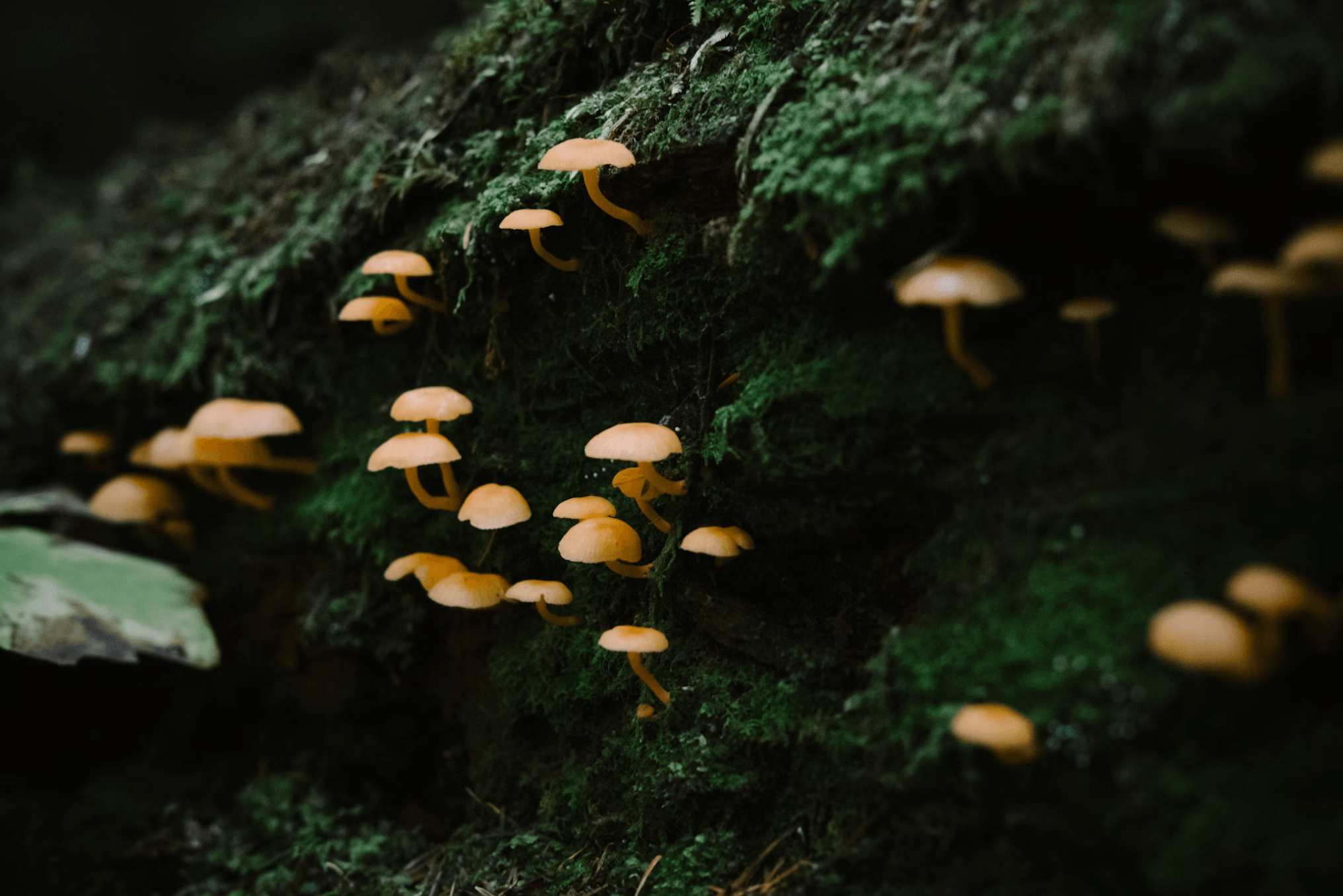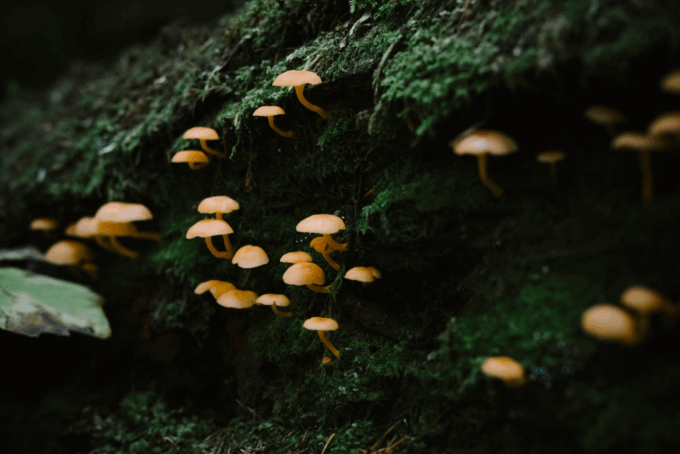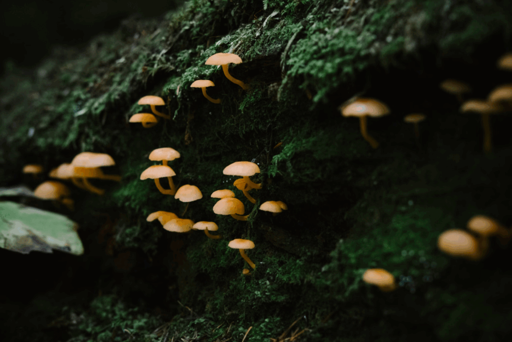

Photo by Jesse Bauer
One’s relationship to the world of mushrooms, toadstools and fungi in general is probably shaped largely by one’s perception of these organisms’ role in the greater scheme of things. Or maybe it’s based on something simpler, like whether or not one likes the taste of edible mushrooms or has had a fungus like ringworm grow on their body. In a remarkably delightful new book titled Fearless, Sleepless, Deathless: What Fungi Taught Me about Nourishment, Poison, Ecology, Hidden Histories, Zombies, and Black Survival from writer and educator Maria Pinto, the reader visits their relationship to the mycelial world and learns about it anew. Likewise, the relationship of fungi to and with the world’s inhabitants is both revealed and reconsidered. In addition, the racism of what we call western science is explored, criticized and critiqued. So too, are the gender and class assumptions of the modern world and its wars, destruction and economic systems that seem to require devastation to survive while creating despair among those whose benefits from said systems are few if any.
However, fungi are not metaphors, although it might be easy to consider them as such. No, writes Pinto, they “are wholly of themselves,” and experts at revealing connections between lifeforms that are neither obvious or apparent. It is this understanding that provides the author with a foundation to compose—and compose she does. Each of the nine essays in the text—essays which, like their fungal subject matter exist singularly and in some kind of complementary even harmonious solidarity—are given a title featuring the name of a mushroom or fungal creature. Except for the first essay in the collection, which is titled “In Search of Junjo (The Jamaican Mushroom)”, every other essay includes the Latin nomenclature of the fungus the essay is nominally about.
That first essay (or chapter, if you will) begins with Pinto’s story of how she became something of an obsessive about fungi. From there, we are introduced to the author’s mother and family, their origins in Jamaica and eventual move to Florida. Colorful descriptions of mushrooms turning blue when picked as a reaction to the wounding of its flesh transit to a discussion about being Black in the woods of the United States; woods being places all too often being perceived as places only white-skinned folks go to explore and commune with nature. As the text progresses, a history of the African diaspora—a diaspora marked by its brutal enslavement those forced into its grasp—unveils itself in a sentence here and a paragraph or two there. The manner in which the author weaves this human history into her story of mushrooms and fungi is probably best explained by this sentence of hers: “They can chop down family trees, even hang us from them, but the mycelium keeps spreading under their feet.” (37)
I read Fearless, Sleepless, Deathless while traveling on buses from my home in northwestern Vermont to my daughter’s home on the Atlantic coast about two hours north of Portland, Maine. As is often the case when traveling, the rhythm of the bus wheels rolling on the highway lulled me into brief ten-minute naps along the way. The beauty of Pinto’s prose, its lucid yet poetic tempo, informed my dreams in those drowsy interludes. The subject matter informed the foci of these naps. I remembered an afternoon in the forests east of Eugene, Oregon; a forest named after the indigenous who lived and live there, the Umpqua. It was during an annual gathering of shamans, gurus, street people, new age hustlers and people looking for meaning at least for a few days known as the Rainbow Gathering. It was during a walk through the woods in the valley where we camped that I found some healthy-looking Amanita muscaria mushrooms, bright red with white cottage cheese-like dots. These were the mushrooms of ancient fairytales, of the so-called berserkers in the Russian steppes; I had wanted to experience their mind-modifying effects for at least the previous five years. I cut them from the ground, and when I returned to camp, cut them into small pieces and boiled the pieces in water for a while. Then I sipped on a cup of the tea. It wasn’t long before the world around me looked different and my ability to talk disappeared. A few hours later, I was back in my own mind and a bit tired. I tell this, because it’s that experience which convinced me that the purpose of fungi, its reason for existing, is greater than anything I might have previously considered. Pinto’s text and the essays therein provided me with a similar revelation. Her discussion of psilocybin—another magical mind-bending mushroom—and its current manifestations in expensive healing centers for well-off techies and the chic is followed by her story of Atlanta’s Cop City and the resistance against it. A chapter on foraging and the ethics around it evolves into a discussion of the meaning of public lands in an economic culture based on the private ownership of everything, including water. I was reminded of a brief period in my life when a friend and I foraged for chanterelles past the clearcuts of the Olympic Peninsula; we sold them to local restaurants in Olympia, Washington. Years later, the chanterelle crop had shrunk, in large part because of over-harvesting and harvesting in such a way that the aboveground part pf the fungi could not grow back. It was that part of the mushroom that people ate. Foraging had become an organized practice instead of the individual pursuit it still was when I took part.
The mycelial universe mused upon in Fearless, Sleepless, Deathless is considerably more than a metaphor for how humans need to interact for earth and its creatures to survive. Pinto’s text is simultaneously a call for acknowledgement of that universe’s power and something of an instruction manual on interacting with it. The writing is seductive, inviting and an invitation to heed the reality we exist in; to appreciate it by understanding it from a place that investigates human interactions and relationships with it, not by dominating or desiring to dominate it only because we are human and it isn’t. Like the life forms it describes and considers, Pinto’s writing (and here I paraphrase) knits together those things that at first glance, appear discrete. The result is a revelation and a delight.
The post Fungi, from Jamaica to Cop City and Beyond appeared first on CounterPunch.org.
From CounterPunch.org via this RSS feed


